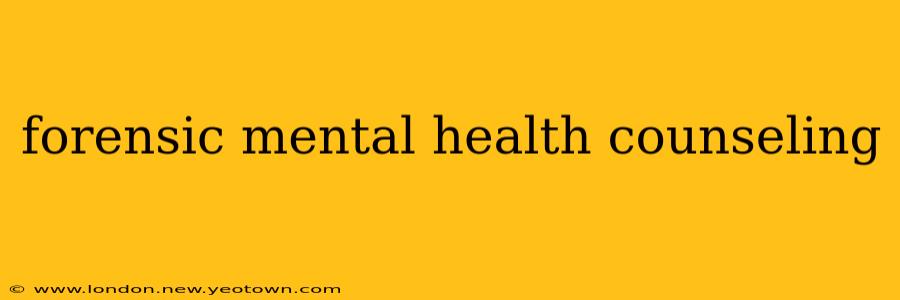The world of forensic mental health counseling sits at the fascinating and often challenging intersection of psychology and the legal system. It's a field where therapists become detectives, meticulously piecing together the puzzle of a client's mental state within the context of a legal case. This isn't your typical therapy session; it's a journey into the intricacies of the law, requiring specialized skills and a deep understanding of both mental health and legal procedures.
What is Forensic Mental Health Counseling?
Imagine a scenario: a defendant stands accused of a crime, their mental state a central question in the trial. This is where a forensic mental health counselor steps in. They conduct comprehensive evaluations, interviews, and reviews of records to determine a person's competency to stand trial, their sanity at the time of the alleged offense, or their risk of future violence. Their expert opinions, often presented in court, can significantly impact the course of legal proceedings and the lives of those involved. The work extends beyond criminal cases; it also plays a crucial role in civil matters, such as child custody disputes and personal injury claims where mental health is a key factor.
What are the Roles and Responsibilities of a Forensic Mental Health Counselor?
Forensic mental health counselors wear many hats. They are clinicians, investigators, and expert witnesses, all rolled into one. Their primary responsibilities often include:
- Conducting comprehensive psychological evaluations: This involves using a range of assessment tools and techniques to evaluate a person's mental state, including interviews, psychological testing, and review of relevant records.
- Preparing detailed reports: These reports meticulously document the evaluation process, findings, and conclusions, which are crucial for legal proceedings.
- Testifying in court: Forensic counselors often provide expert testimony, explaining their findings and answering questions from lawyers. This demands clear communication, strong advocacy skills, and the ability to remain objective under pressure.
- Consulting with legal professionals: They act as consultants to attorneys, judges, and other legal professionals, offering insights into the mental health aspects of a case.
What Education and Training is Required to Become a Forensic Mental Health Counselor?
This specialized field demands rigorous training. A master's degree in counseling, psychology, or social work is essential, often followed by specialized training in forensic psychology or forensic mental health. Many professionals pursue additional certifications or fellowships to enhance their expertise. Experience in clinical settings and a solid understanding of legal concepts are equally crucial. The path is demanding, but it's a rewarding one for those passionate about blending their clinical expertise with legal proceedings.
How Does Forensic Mental Health Counseling Differ from Traditional Counseling?
The key difference lies in the context. While traditional counseling focuses primarily on the client's well-being and therapeutic growth, forensic counseling operates within the legal framework. The primary goal in forensic cases is not necessarily to treat the individual but to provide objective evaluations and expert opinions to the court. Confidentiality is also different; while the therapist-client privilege exists, it's often limited or non-existent in forensic settings.
What are the Ethical Considerations in Forensic Mental Health Counseling?
Ethics are paramount in this field. Forensic mental health counselors must adhere to strict ethical guidelines, balancing their professional obligations with the legal requirements of the case. This includes maintaining objectivity, avoiding conflicts of interest, ensuring the validity of their assessments, and protecting client rights. Maintaining confidentiality within the bounds of the law is crucial.
What are the Career Prospects and Salary for Forensic Mental Health Counselors?
The demand for forensic mental health professionals is increasing, driven by a growing awareness of mental health issues within the legal system. Job opportunities can be found in various settings, including courts, correctional facilities, private practices, and hospitals. Salaries generally reflect the expertise and experience of the counselor, tending to be competitive within the mental health field.
This journey into the world of forensic mental health counseling reveals a field that's both intellectually stimulating and deeply impactful. It requires a unique blend of clinical skills, legal knowledge, and unwavering ethical commitment. For those drawn to the complexities of the legal system and the intricacies of the human mind, this career path offers a challenging yet rewarding path.

